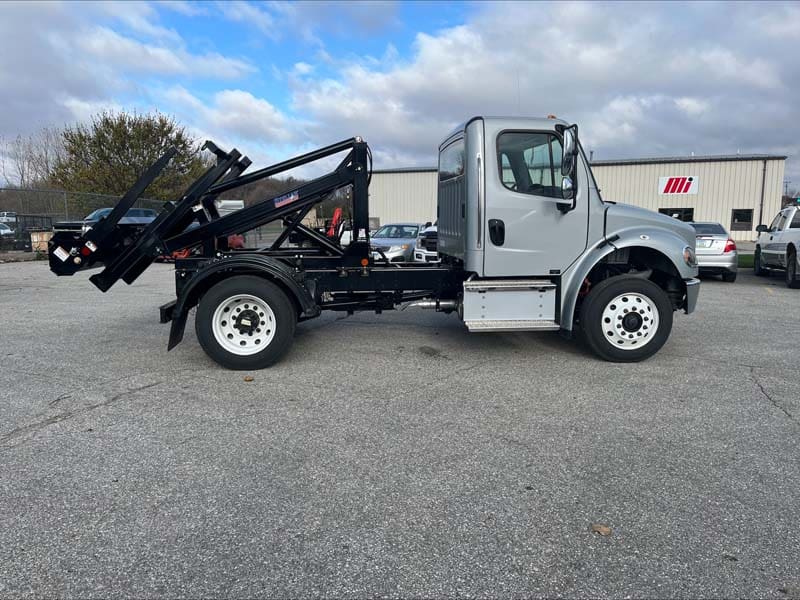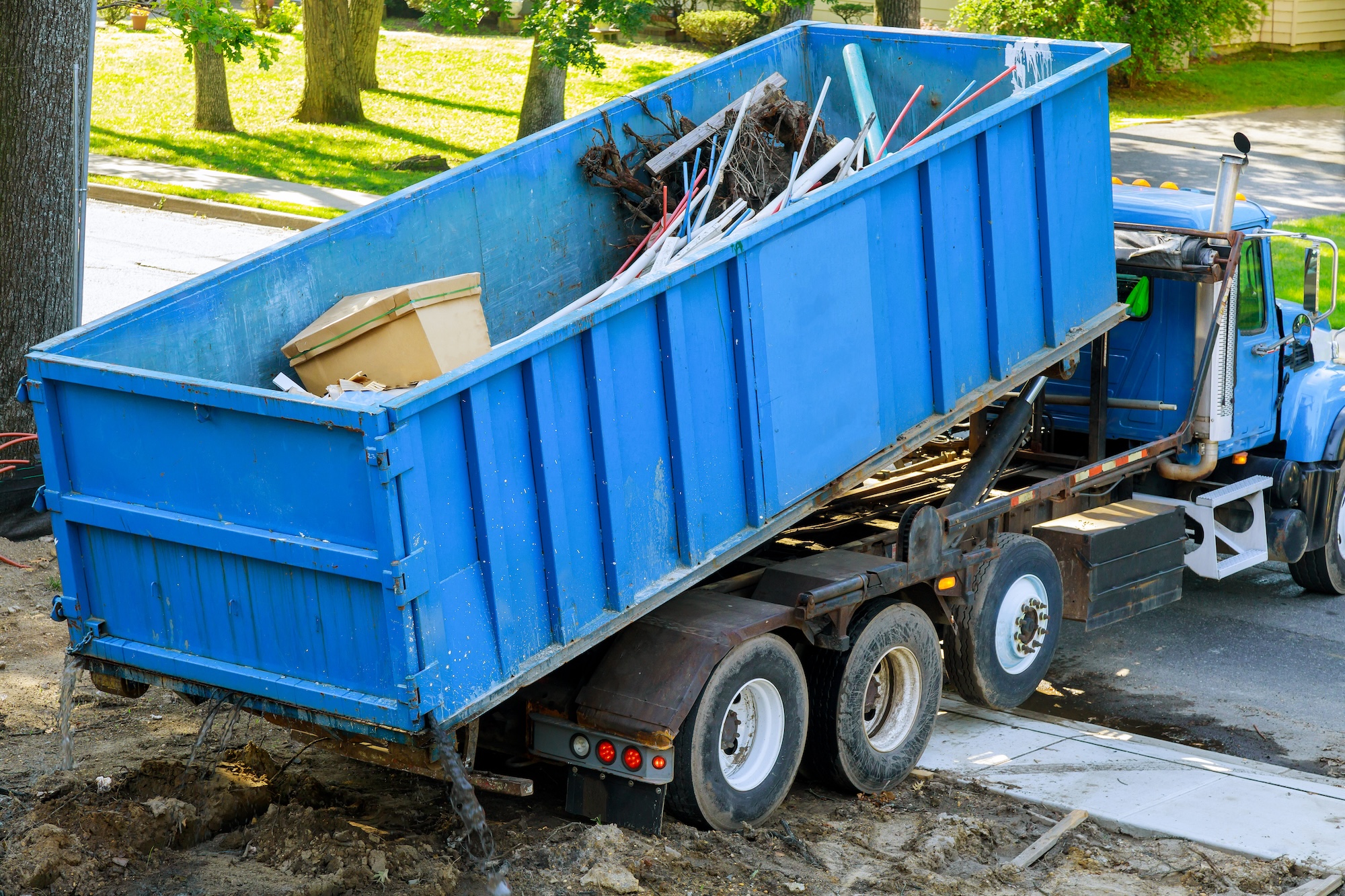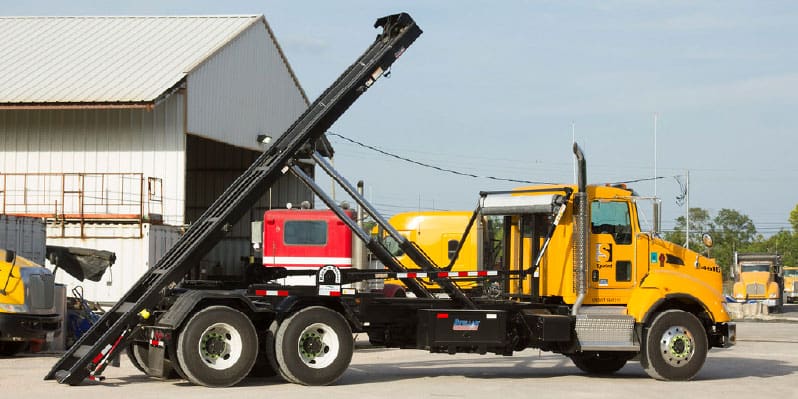Did you know that 60% of the U.S. waste management industry relies on roll off trucks for waste collection and disposal? These trucks are not only efficient but essential for handling large-scale projects, from municipal cleanups to massive construction jobs. Whether you’re managing debris on a construction site or coordinating waste removal for a big project, a roll off truck is the backbone of the operation. Let’s dive into everything you need to know about these workhorses—and how we can help customize them to fit your needs.
When You Need a Roll Off Truck
When it comes to heavy-duty waste management and construction, roll off trucks are the go-to solution for hauling large volumes of debris. Whether it’s a job site cleanup or a demolition project, these trucks are built to handle the toughest loads with ease.
But what exactly is a roll off truck? Simply put, it’s a truck designed to carry roll-off containers—those massive dumpsters you see on construction sites. Thanks to their hydraulically operated beds, these trucks make it easy to load, transport, and offload containers, saving time and manpower.
Roll off trucks are indispensable across industries like construction, waste management, and recycling, where large amounts of waste need to be moved efficiently. Their ability to carry different-sized containers makes them versatile and adaptable to various projects, whether you’re hauling scrap metal, concrete, or general refuse. These trucks don’t just make the job easier—they keep operations running smoothly and safely by streamlining the entire process.

3 Main Types of Roll Off Trucks
Now that you understand the basics, let’s explore your roll of truck options. There are three main types of roll off trucks you’ll come across: hooklift trucks, cable hoist trucks, and the hybrid Ampliroll system. Each has its strengths and weaknesses depending on the type of job you’re working on.
Hooklift Trucks: The hooklift system is perfect for lighter loads and smaller-scale projects. Using a hydraulic hook to grab and load the container, this system is popular in tight spaces like urban areas where maneuverability is key. It’s a simple and efficient solution for tasks like roofing jobs, kitchen remodels, or residential cleanups. One of its standout features is that the driver never has to leave the cab to load or unload, making it a safer option. You can learn more about this specific type in our guide to hooklift trucks here.
Cable Hoist Trucks: For larger, heavier loads, the cable hoist system is typically your best bet. These trucks use a winch and cable to pull the container onto the truck bed. While this system requires the driver to step out and secure the cable, it’s built to handle bigger containers and works well in areas with limited overhead clearance. This makes it ideal for demolition sites and large construction projects, where heavy debris needs to be moved.
Ampliroll Trucks: A more sophisticated option, the Ampliroll system combines elements of both hooklift and cable hoist systems. These trucks offer versatility in container sizes and faster loading times, but they come at a higher cost. They’re typically used in specialized industries where both speed and flexibility are crucial.
Each type of roll off truck has its place depending on the scope of the project and the type of waste being handled. Whether you’re working on a small home renovation or a large industrial cleanup, there’s a roll off truck designed to meet your needs.
Roll Off Truck vs Hooklift: What’s the Difference?
When choosing the right system for your business, it’s important to understand the differences between a roll off truck and a hooklift system. Both are designed to load and transport dumpsters, but they operate in distinct ways, each with its own strengths.
A roll off truck with a cable hoist system uses a winch and cable to pull the dumpster onto the truck. This system is ideal for heavy loads and larger containers because it distributes the weight more evenly during the loading process. It also works better in areas with low overhead clearance, making it a good choice for construction sites or jobs with tight vertical space.
On the other hand, a roll off hooklift truck uses a hydraulic hook that attaches to the container and lifts it onto the truck’s bed. This system is more versatile for smaller projects and tighter spaces, especially in urban areas where maneuverability is key. One of the biggest advantages of a hooklift system is that the driver can load and unload the container without leaving the cab, which not only saves time but also enhances safety.
In short, if you’re dealing with heavy materials or low clearance, a cable hoist roll off truck is your best bet. For smaller projects or those requiring quick turnarounds, a hooklift system will serve you well.

Roll Off Dumpsters: The Perfect Waste Management Solution
A roll off dumpster is the ideal tool for handling large volumes of waste quickly and efficiently. Whether you’re dealing with construction debris, demolition waste, or even a large-scale cleanup, roll off dumpsters simplify the process by allowing easy loading and transportation. These dumpsters come in various sizes, typically ranging from 10 to 40 yards, and can be customized to meet the specific needs of your project.
For construction managers and waste management companies, using roll off dumpster trucks allows for better control over waste disposal, ensuring that materials are properly contained and transported to the correct facilities. This not only improves site safety but also helps maintain regulatory compliance.
Choosing the right dumpster size depends on the scope of your project. Smaller dumpsters (around 10 to 20 yards) are great for residential cleanouts or light construction, while 30- to 40-yard dumpsters can handle heavy-duty demolition projects.

Custom Roll Off Truck Options
At Pacific Truck Colors, we understand that no two jobs are the same, which is why we offer a wide range of custom roll off truck options. Customization can make a huge difference in your daily operations, whether you need to handle heavier loads, improve fuel efficiency, or simply stand out with a unique paint job or vehicle graphics.
Hydraulic Upgrades: For operations that demand frequent loading and unloading, upgrading the hydraulic system can dramatically improve speed and efficiency. A stronger hydraulic setup means quicker lifts and lower downtime.
Chassis Modifications: Need to carry heavier loads? Reinforcing the chassis of your roll off truck will give it the durability to handle increased weight without compromising safety.
Custom Paint Jobs and Branding: For companies looking to stand out, we provide custom paint jobs, vehicle wraps, graphics, and decals. Not only do these upgrades protect your truck’s exterior, but they also transform your vehicle into a rolling advertisement, building trust and boosting brand visibility on the road. Whether it’s a unique color scheme or bold decals with your logo, custom branding is a smart investment in both your truck and your business. Check out our custom wraps and graphics here.
Accessories: For added functionality, consider accessories like toolboxes, safety lighting, or mud flaps to ensure your truck is equipped for any job. These additions can make daily operations smoother while ensuring your vehicle meets safety standards and looks professional on the job.
When you invest in customizing your roll off truck, you’re not just getting a vehicle that works for today—you’re building a fleet that will keep your business ahead of the competition for years to come.

How to Maintain Your Roll Off Truck for Longevity
Regular maintenance is key to ensuring your roll off truck remains reliable and efficient over the long haul. By staying on top of daily and scheduled maintenance tasks, you can avoid costly downtime, prevent equipment damage, and extend the lifespan of your truck.
Hydraulic System Checks: A well-maintained hydraulic system is essential to a roll off truck’s performance. Experts note that contaminated hydraulic oil can lead to pump failure, which might require a complete system flush and replacement. To prevent unnecessary wear, it’s important to keep hydraulic oil clean and to inspect hoses and cylinders regularly for any signs of leaks.
Lubrication: One of the most critical maintenance tasks is greasing. Regularly lubricating grease fittings can prevent hoist failure and avoid expensive repairs. In Recycling Today, Greg Brown, president of Benlee, highlights that “if you grease roll-offs, they will last forever,” which emphasizes the importance of this simple yet effective preventive measure.
Frame and Chassis Care: Given the heavy loads that roll off trucks handle, it’s important to inspect the chassis and frame for any signs of rust or structural damage. Proper cleaning and lubrication of pivot points and pins can help reduce wear and tear, extending the life of these components.
Daily Visual Inspections: Before every job, it’s vital to conduct a quick inspection of the truck, looking for loose bolts, hydraulic leaks, or fraying cables. These checks can prevent minor issues from becoming bigger problems that lead to costly repairs or downtime.
Following these simple maintenance steps not only increases the longevity of your roll off truck but also ensures that it operates safely and efficiently on every job.
Roll Off Truck Customization & Maintenance with PTC
Roll off trucks are indispensable in industries ranging from construction to waste management. With their ability to handle large volumes of material, these workhorses can be tailored to meet the needs of any job site.
If you’re in Oregon, where waste management regulations are tough and the jobs keep piling up, you need a truck that’s built to handle the load. That’s where we come in. At Pacific Truck Colors, we’ve got you covered with everything from hooklift upgrades to custom paint jobs and vehicle graphics that make your fleet stand out.
Ready to get started? Reach out to us today to learn how we can help customize your roll off truck for maximum efficiency and performance.
Roll Off Truck FAQs
What is a roll off truck?
A roll off truck is a vehicle designed to transport large dumpsters, using either a hooklift or cable hoist system to load and unload containers efficiently.
Is a roll off truck the same as a dump truck?
No, a dump truck transports loose materials like gravel or sand, whereas a roll off truck is used to move large containers (dumpsters).
What is the roll off truck procedure?
The procedure involves positioning the truck, attaching the dumpster via a hook or cable, and using hydraulics to load and unload the container.
Got more questions? Contact our experts anytime!
